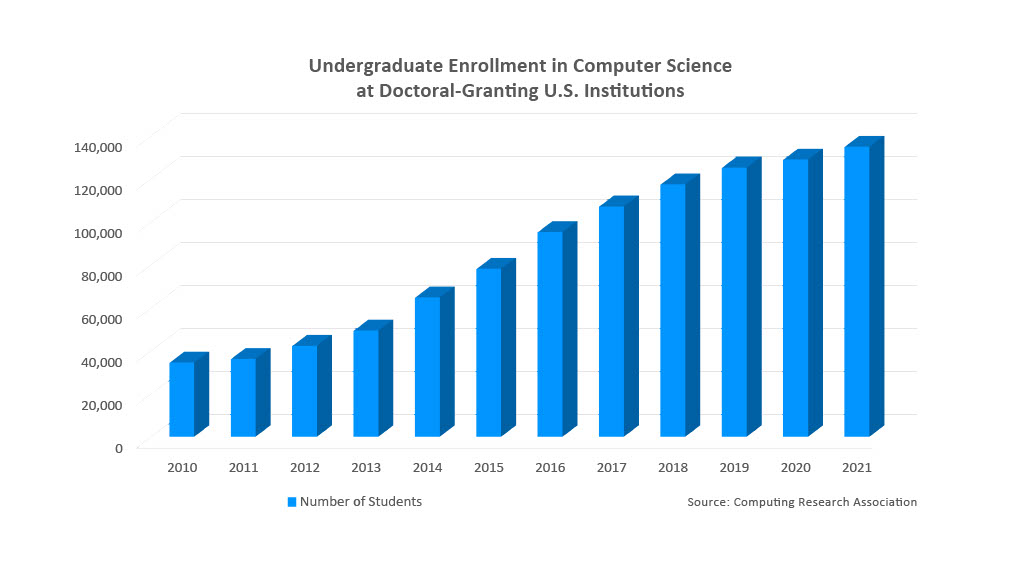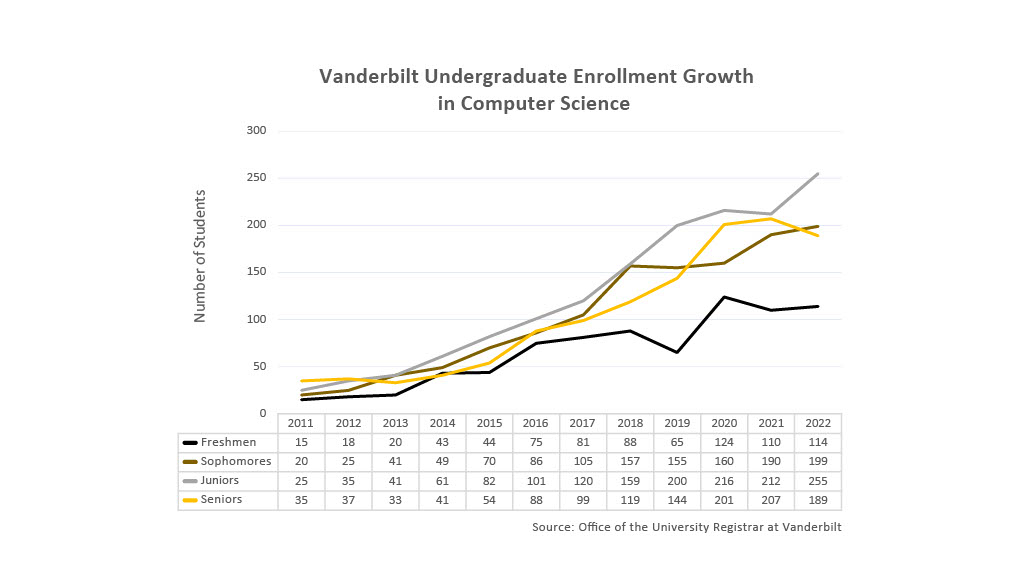By Lucas Johnson
In the early months of 2020, just as the COVID-19 pandemic was scrambling university budgets and hiring plans across the country, Vanderbilt saw a golden opportunity to catapult its rapidly growing computer science program into the upper ranks of this booming field.
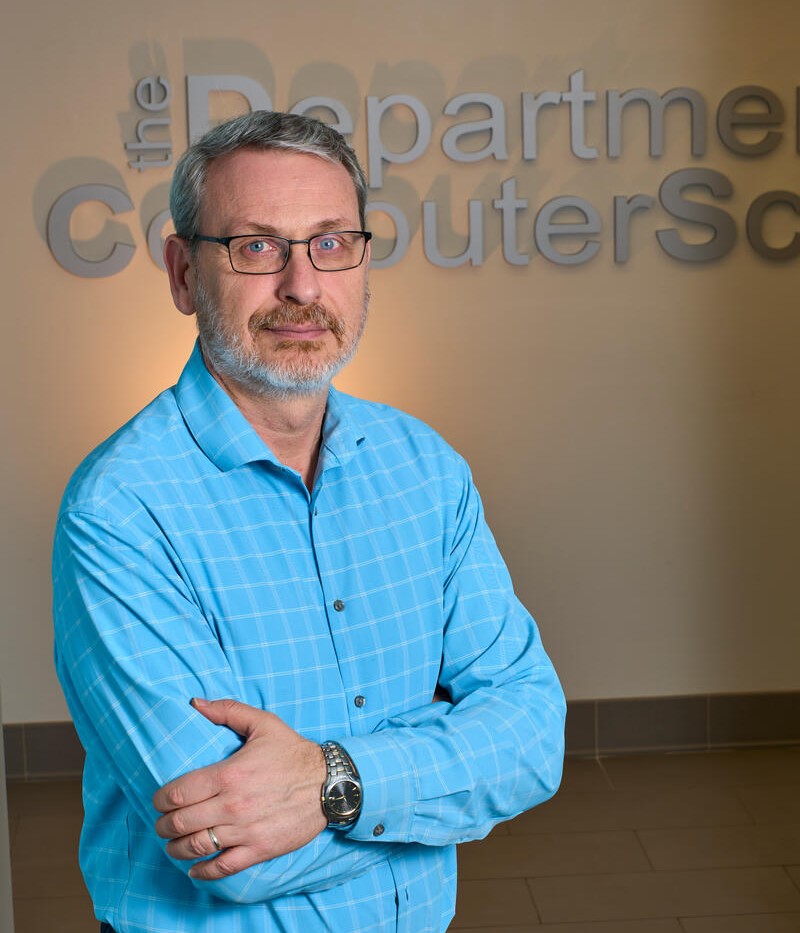
In September of that year, the university launched Destination Vanderbilt, a $100 million initiative to recruit new faculty over and above normal hiring. The initiative targeted several key growth areas, with computer science being a primary focus.
Since Destination Vanderbilt launched, the computer science department has hired 14 new tenure-track faculty members—nearly doubling its ranks—and it continues to experience record undergraduate and graduate enrollments each year. The department has also launched several successful online programs, including a CS Master of Science program that was ranked No. 1 by Fortune in July 2022.
“Destination Vanderbilt has truly changed the game for the School of Engineering and the university as a whole,” says Philippe Fauchet, the Bruce and Bridgitt Evans Dean of Engineering. “This initiative has allowed Vanderbilt to emerge as a global leader in the field — and we have no plans to slow down our efforts anytime soon.”
Fauchet notes too that the department is hardly a silo. As data science and computational methods reach into fields spanning everything from the life sciences to law and business—even the humanities— faculty members are working across a variety of disciplines. And the department’s close connections with Vanderbilt University Medical Center have proven to be an exceptional draw for some of the nation’s top researchers, he adds.
“For over a decade, but especially in the last two years, Vanderbilt’s computer science department has experienced incredible growth that is drawing the attention of top-ranked faculty and students,” says department chair Xenofon Koutsoukos, professor of computer science, computer engineering, and electrical engineering. “We plan to continue to build on that momentum by showcasing the innovative research produced by those special faculty and students who selected Vanderbilt as their destination.”
According to the Computing Research Association, which tracks computing degrees at about 200 universities, the number of undergraduates majoring in computer science more than tripled from 2011 to 2021, to nearly 136,000.
Fall-Undergraduate-Enrollment-Growth Enrollment figures in Vanderbilt’s CS Department reflect those trends. In the fall of 2011, the School of Engineering had an enrollment of 95 (including double majors) undergraduates in computer science. By fall 2022, that number jumped to 757 (including double majors). At the graduate level, Vanderbilt’s MS program had an enrollment of 11 in the fall of 2011, and 53 Ph.D. students. By the fall of 2022, those numbers rocketed to 173 in the master’s program, and 127 doctoral students. The biggest increases occurred after 2020, when Vanderbilt started its online CS master’s program. In 2020, there were 67 MS students enrolled. Two years later, it jumped to 173, with 108 of those students enrolled in the online program.
“We’re seeing a healthy growth in the enrollment in our MS and Ph.D. programs in computer science, especially over the last three years,” says E. Duco Jansen, senior associate dean for Graduate Education and Faculty Affairs in the School of Engineering. “In the MS program, our No. 1 ranked online CS master’s degree program is largely responsible for this growth. The Ph.D. program has seen significant growth, as we nearly doubled out CS faculty, and thus our research portfolio over the past three years.”
NEW FACULTY
The goal of Destination Vanderbilt is to hire 60 new faculty university-wide. Of that number, 20 are to be hired in computer science. James Weimer is one of the 14 new faculty members who have joined the department through the hiring initiative. He runs the internet-of-medical-things (IoMT) lab at Vanderbilt and was recently recognized by Time magazine for developing an algorithm that powers Neuralert, a non-invasive wearable bracelet that detects strokes. Time called it one of the top inventions of 2022 and the FDA designated it as a breakthrough device. Weimer says part of the reason he chose to come to Vanderbilt was because of its top-rated medical center next door.
“My research and what I work on in the intersection of computer science and medicine and cyber physical systems (CPS) requires basically those things to be in place,” says Weimer, an assistant professor of computer science who came to Vanderbilt from the University of Pennsylvania. “Vanderbilt has one of the strongest CPS groups and a world-class medical center. It was a great opportunity, and I took it.”
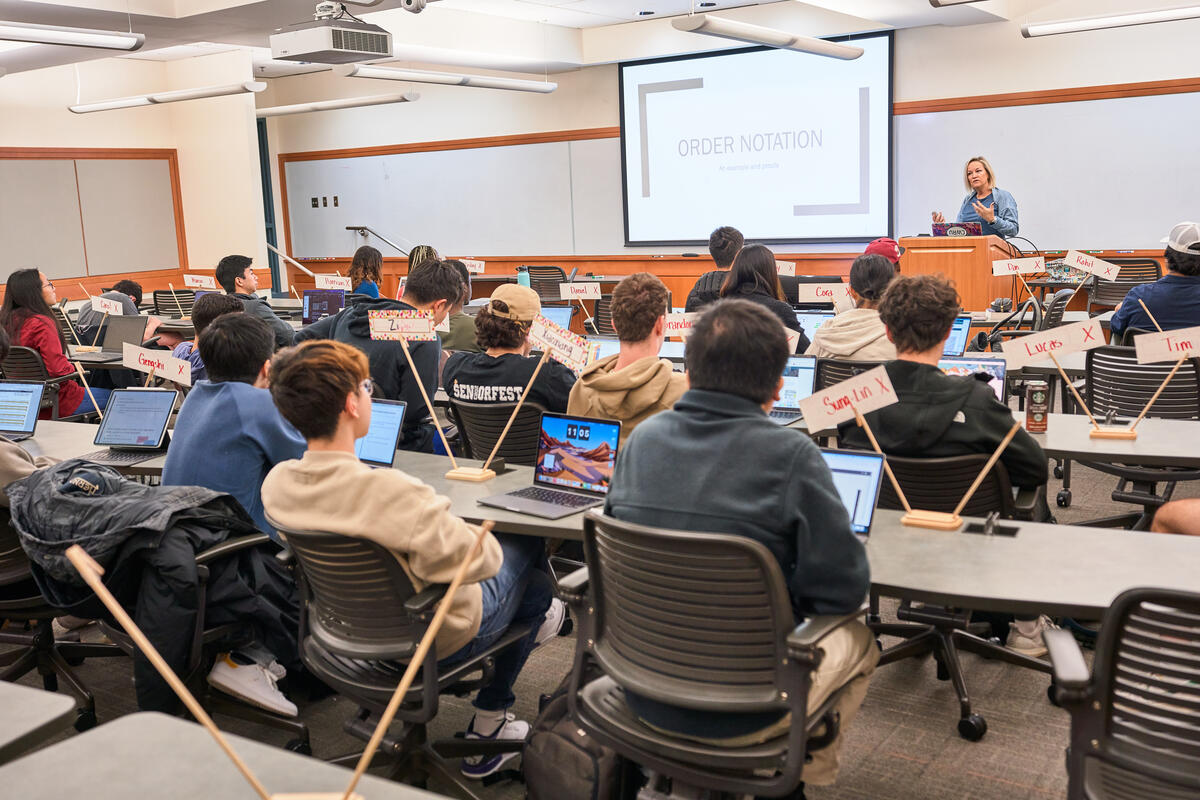
The multi-year faculty recruitment and hiring initiative seeks to fill tenure-track positions at the assistant, associate, and full-professor levels, but with preference at early-career appointments.
“Hiring computer science professors in this economy is extremely competitive and we work to attract the most qualified candidates,” says Julie Johnson, associate chair of the Computer Science Department. “The fact that five of our recent hires are women demonstrates the depth of qualified women candidates in a field where their total number is in decline. I’m pleased that Vanderbilt’s CS Department is seen by women as a place where they can thrive as academics.”
Peng (“Dana”) Zhang, assistant professor of the practice of computer science, is another one of the new hires in the department. Zhang, whose expertise includes blockchain research, healthcare interoperability, and data science education, says the department’s interdisciplinary collaborations is one of the main reasons she is at Vanderbilt.
“I am most impressed with the broad range of research expertise of the CS Department and its trans-institutional collaboration opportunities to further enhance students’ learning as well as research experience,” Zhang says. “Since I joined Vanderbilt as faculty, I have had the opportunity to instruct graduate students and mentor them in research at the data science institute and in the online MS CS program. Additionally, I have been mentoring undergraduate students in applied research to help facilitate data sharing for rare disease communities through VU immersion projects and research courses. I plan to contribute to the enrichment of the undergraduate research experience here in addition to creating advanced courses that focus on cutting edge topics that are in use or currently being explored in the industry.”
Jie Ying Wu, assistant professor of computer science who specializes in medical robotics, joined the faculty in 2022 and says she was also attracted to Vanderbilt because of its collaborations and the fact that there are already established researchers working on surgical robotics.
“I plan to work on making surgical tools and robots smarter; I want tools to have better models of the surgeon’s intent and thus be better able to support them,” Wu says. “I’m also looking to use surgeon metrics such as eye-gaze and pupillometry to improve surgical training so that novices acquire skills faster and retain them longer.”
INTERDISCIPLINARY COLLABORATION
Vanderbilt’s computer science program has long been supportive of interdisciplinary work, but in recent years has increased collaboration with departments across the university. The research and teaching activities range from artificial intelligence and cyber security to clean energy and medical devices.
One collaboration that is becoming more typical at Vanderbilt is something like the work of Catie Chang, a multidisciplinary Vanderbilt scientist who holds faculty appointments in electrical and computer engineering, computer science and biomedical engineering. She has several Vanderbilt collaborators – including researchers from Peabody College, the Department of Psychology, the Institute for Imaging Science, and the Department of Biostatistics – to research new computational methods for understanding how the brain works.
“Neuroimaging research is definitely enriched by collaboration with scientists from a range of backgrounds.” Chang says. “Through our collaborations, we also become aware of scientific questions that may benefit from the development of new data analysis methods, inspiring directions of work in our lab.”
Doug Schmidt, Cornelius Vanderbilt Professor of Computer Science and associate chair of the CS Department, says such collaborations are also attractive to funding agencies.
“The days of purely disciplinary work, while not entirely gone, are certainly less emphasized in funding agencies nowadays than they used to be 10, 20, 30 years ago,” says Schmidt. “If you want to continue to be competitive as an academic, it’s helpful to team up with people in other disciplines. And Vanderbilt’s really been a leader in this.”
The collaborations also provide enhanced research and teaching opportunities that further help prepare students for a competitive global job market.
WORKFORCE DEMAND
Between 2021 and 2031, employment for software developers is expected to grow 25 percent, according to projections from the Bureau of Labor Statistics. In Vanderbilt’s CS program, nearly 80 percent of Bachelor of Science graduates in May 2022 received job offers from companies like Amazon, Capital One, Facebook, Google, and Microsoft, just to name a few, with median starting salaries around $120,000.
“Our students are well-rounded,” Koutsoukos says. “They’re not only strong technically, but they have a strong education in the liberal arts and social science. They know how to communicate, how to lead.”
It is these types of students that draw the attention of tech business partners and Vanderbilt alumni Andrew Kerr, BA ’00 and M.Ed. ‘03 and Logan Buchanan, BS ’09. They own a Nashville-based company called FortyAU, which specializes in custom application development, such as websites, mobile apps, enterprise software, and data analytic solutions.
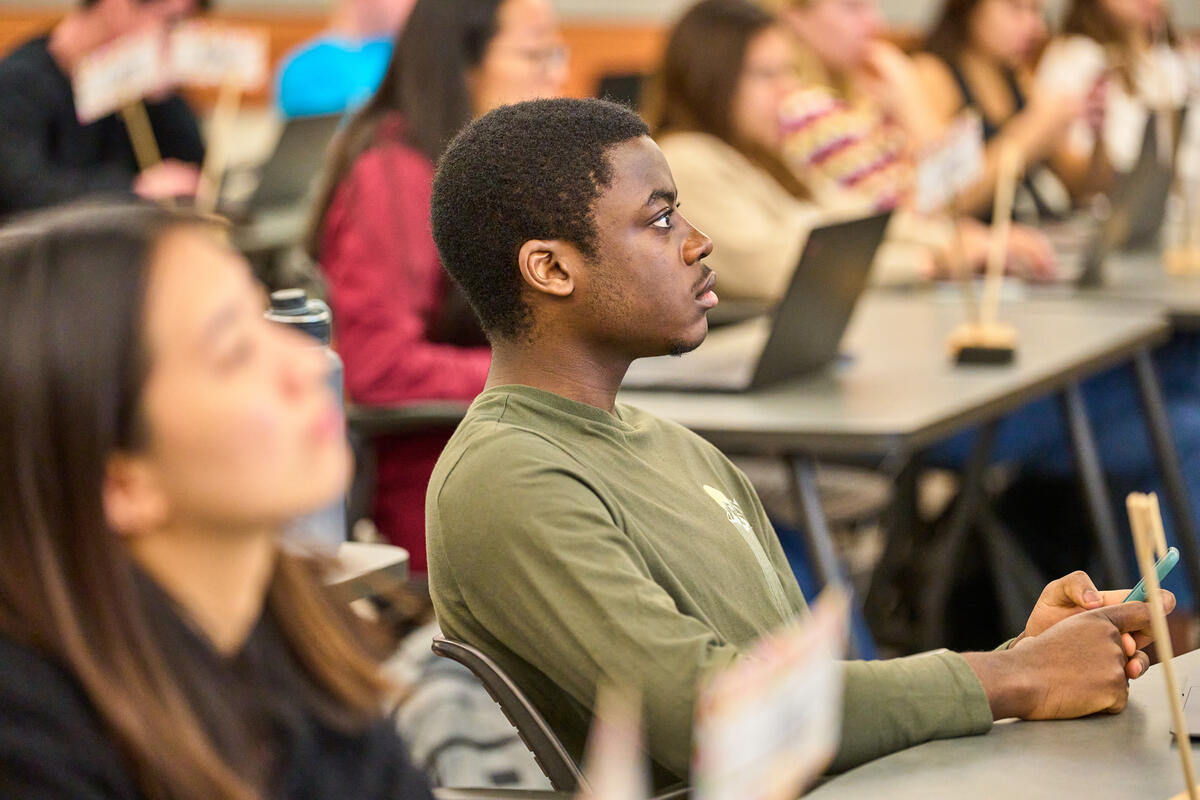
In the last two years, they have hired at least 10 CS Vanderbilt graduates. In addition to being well-rounded, Kerr says graduates usually have some type of hands-on experience.
“One of our best developers that came out of Vandy, we met him on a startup when he was an undergrad,” Kerr says. “He was getting hands-on experience solving real-world problems. Anybody that we hire nowadays directly out of school, I’m looking for something else on their resume that shows they’ve taken that technology and used it in real-world situations; we’re looking for that applicability.”
Buchanan recalls one computer science class at Vanderbilt his senior year in which the professor made sure he and his fellow classmates knew how to apply their knowledge to real-world situations.
“He said, ‘I think a lot of you don’t quite understand how to really write an actual piece of code or an application.’ So, he walked us through it,” Buchanan says. “He reinforced the previous three years. He was able to relate what we had learned, how it should be applied. And I think everyone I graduated with in 2009 came out with a pretty strong understanding of actually how to write code right when they got into the workforce.”
Vanderbilt doctoral student Sam Hays strongly believes in workforce readiness. He got a master’s through the university’s CS online program and is a year into his doctorate. Even though he has years of experience in his field, he says Vanderbilt instructors are providing him with tools that will help in preparing students for the workforce.
“I really appreciate the opportunity Vanderbilt has given me,” says Hays, who has close to 20 years of experience in the security field. “I’ve spent a lot of time in the business world. Going through school a little bit later in life, I’ve got a perspective about the delta between the world you see in industry and the world you see in academia.”
Rajay Preddie of Winter Garden, Florida, is a junior in Vanderbilt’s accelerated BS/MS computer science program studying to become a software engineer. He says he appreciates the hands-on experiences the instructors provide and feels he’ll be ready to make a mark when he graduates.
“Having professors that are able to express the nuanced importance of various concepts in CS helps me to see how each portion of CS comes together to form the bigger picture in software engineering,” Preddie says. “I’m building the foundation I need to be the best at what I want to do.”
